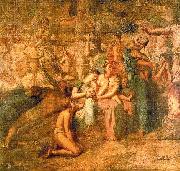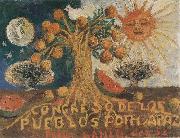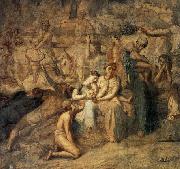Wholesale Oil Painting No Minimum |
|||||||||||
|
|
|||||||||||

|
|||||||||||
|
|
|
||||||||
Theodore Chasseriau1819-1856 French Theodore Chasseriau Locations 1819?C56, French painter, b. Santo Domingo. He entered Ingres studio at the age of 12; five years later he gained immediate recognition with the exhibition of his Cain, Cursed and Return of the Prodigal. Chass??riau was the only artist of the age who successfully combined Ingres sense of line and Delacroix rich color and vitality and, at the same time, created his own personal style. After his visit to Algeria in the 1840s, he emphasized the exotic, romantic elements in his painting, while still adhering to classical techniques. Among his best-known works are the Two Sisters, Arabian Challenge, and Tepidarium (all: Louvre). His mural decorations for the Cour des Comptes of the Palais d Orsay, Paris, were destroyed except for a few fragments preserved in the Louvre. His untimely death cut short a brilliant career. |
||||||||
|
|
||||||||
Peace
Peace Painting ID:: 396 |
Musee du Louvre, Paris Musee du Louvre, Paris |
|||||||
|
|
||||||||
Frida Kahlo1907-54 Mexican painter, b. Coyoacen. As a result of an accident at age 15, Kahlo turned her attention from a medical career to painting. Drawing on her personal experiences, her works are often shocking in their stark portrayal of pain and the harsh lives of women. Fifty-five of her 143 paintings are self-portraits incorporating a personal symbolism complete with graphic anatomical references. She was also influenced by indigenous Mexican culture, aspects of which she portrayed in bright colors, with a mixture of realism and symbolism. Her paintings attracted the attention of the artist Diego Rivera, whom she later married. Although Kahlo's work is sometimes classified as surrealist and she did exhibit several times with European surrealists, she herself disputed the label. Her preoccupation with female themes and the figurative candor with which she expressed them made her something of a feminist cult figure in the last decades of the 20th cent. |
||||||||
|
|
||||||||
|
|
Peace
Peace Painting ID:: 37163 |
mk118
1952
Oil on canvas
19.1x25.1cm
mk118 1952 Oil on canvas 19.1x25.1cm |
||||||
|
|
||||||||
Theodore Chasseriau1819-1856 French Theodore Chasseriau Locations 1819?C56, French painter, b. Santo Domingo. He entered Ingres studio at the age of 12; five years later he gained immediate recognition with the exhibition of his Cain, Cursed and Return of the Prodigal. Chass??riau was the only artist of the age who successfully combined Ingres sense of line and Delacroix rich color and vitality and, at the same time, created his own personal style. After his visit to Algeria in the 1840s, he emphasized the exotic, romantic elements in his painting, while still adhering to classical techniques. Among his best-known works are the Two Sisters, Arabian Challenge, and Tepidarium (all: Louvre). His mural decorations for the Cour des Comptes of the Palais d Orsay, Paris, were destroyed except for a few fragments preserved in the Louvre. His untimely death cut short a brilliant career. |
||||||||
|
|
||||||||
|
|
Peace
Peace Painting ID:: 62426 |
340 x 362 cm Mus?e du Louvre, Paris This is a from the decoration of the building of the Cour des Comptes, burnt in 1871. Author: CHASS?RIAU, Th?odore Title: Peace Form: painting , 1801-1850 , French , other 340 x 362 cm Mus?e du Louvre, Paris This is a from the decoration of the building of the Cour des Comptes, burnt in 1871. Author: CHASS?RIAU, Th?odore Title: Peace Form: painting , 1801-1850 , French , other |
||||||
|
|
||||||||
|
Theodore Chasseriau 1819-1856 French Theodore Chasseriau Locations 1819?C56, French painter, b. Santo Domingo. He entered Ingres studio at the age of 12; five years later he gained immediate recognition with the exhibition of his Cain, Cursed and Return of the Prodigal. Chass??riau was the only artist of the age who successfully combined Ingres sense of line and Delacroix rich color and vitality and, at the same time, created his own personal style. After his visit to Algeria in the 1840s, he emphasized the exotic, romantic elements in his painting, while still adhering to classical techniques. Among his best-known works are the Two Sisters, Arabian Challenge, and Tepidarium (all: Louvre). His mural decorations for the Cour des Comptes of the Palais d Orsay, Paris, were destroyed except for a few fragments preserved in the Louvre. His untimely death cut short a brilliant career. Peace 340 x 362 cm Mus?e du Louvre, Paris This is a from the decoration of the building of the Cour des Comptes, burnt in 1871. Author: CHASS?RIAU, Th?odore Title: Peace Form: painting , 1801-1850 , French , other |
||||||||
|
|
||||||||
|
Prev Next
|
||||||||
|
|
||||||||
|
Related Paintings to Theodore Chasseriau :. |
||||||||
|
|
||||||||
|
CONTACT US |



